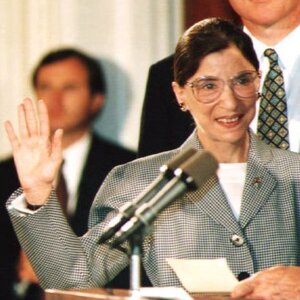News
The Legacy Of The Late Supreme Court Justice Ruth Bader Ginsburg

Supreme Court Justice Ruth Bader Ginsburg — here in her chambers during a 2019 interview with NPR’s Nina Totenberg — died on Friday at the age of 87. Shuran Huang/NPR
The court, in a statement, said Ginsburg died at her home in Washington, D.C., surrounded by family. She was 87.
R.I.P To RBG The Honorable Ruth Bader Ginsburg And A Look Back At Her Impact And Legacy.
THE RISE
In 1980, President Jimmy Carter named Ginsburg to the U.S. Court of Appeals for the District of Columbia Circuit. Over the next 13 years, she would amass a record as something of a centrist liberal, and in 1993, President Bill Clinton nominated her to the Supreme Court, the second woman appointed to the position.
She was not first on his list. For months, Clinton flirted with other potential nominees, and some women’s rights activists withheld their active support because they were worried about Ginsburg’s views on abortion. She had been publicly critical of the legal reasoning in Roe v. Wade.
But in the background, Marty Ginsburg was lobbying hard for his wife. And finally Ruth Ginsburg was invited for a meeting with the president. As one White House official put it afterward, Clinton “fell for her — hook, line and sinker.” So did the Senate. She was confirmed by a 96-3 vote.
LEGACY AND POPULARITY
For more than a decade, until her first judicial appointment in 1980, she led the fight in the courts for gender equality. When she began her legal crusade, women were treated, by law, differently from men. Hundreds of state and federal laws restricted what women could do, barring them from jobs, rights and even from jury service. By the time she donned judicial robes, however, Ginsburg had worked a revolution.
That was never more evident than in 1996 when, as a relatively new Supreme Court justice, Ginsburg wrote the court’s 7-1 opinion declaring that the Virginia Military Institute could no longer remain an all-male institution. True, Ginsburg said, most women — indeed most men — would not want to meet the rigorous demands of VMI. But the state, she said, could not exclude women who could meet those demands.
“Reliance on overbroad generalizations … estimates about the way most men or most women are, will not suffice to deny opportunity to women whose talent and capacity place them outside the average description,” Ginsburg wrote.
She was an unlikely pioneer, a diminutive and shy woman, whose soft voice and large glasses hid an intellect and attitude that, as one colleague put it, was “tough as nails.”
By the time she was in her 80s, she had become something of a rock star to women of all ages. She was the subject of a hit documentary, a biopic, an operetta, merchandise galore featuring her “Notorious RBG” moniker, a Time magazine cover and regular Saturday Night Live sketches.
You can find out more about the life and legacy of Ruth Bader Ginsburg HERE
Find more news HERE

